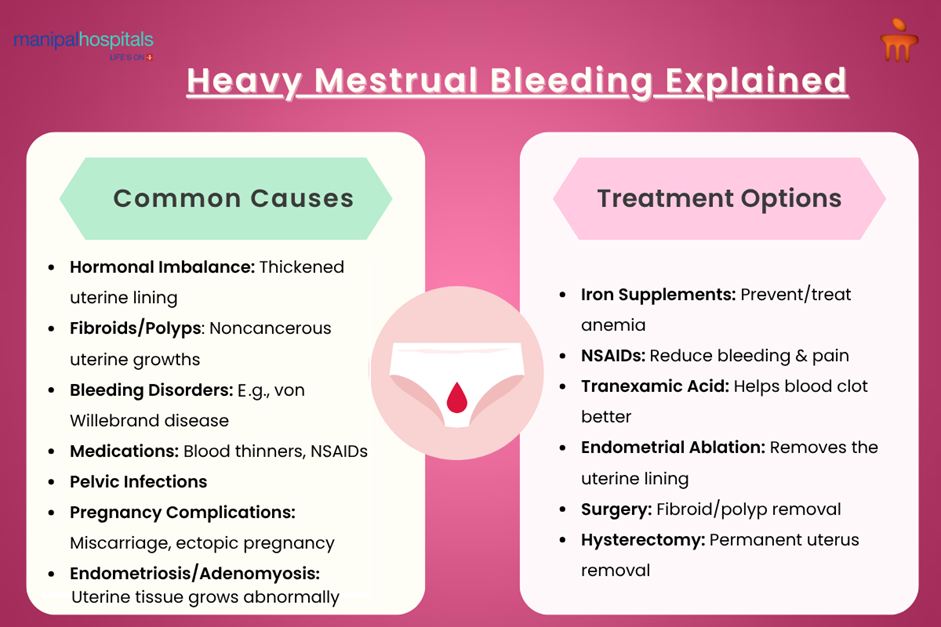
Menorrhagia, also called heavy periods or heavy menstrual bleeding, affects many women and adolescent girls worldwide. The condition can lead to challenges such as fatigue and cramps, which may result in anaemia in severe cases. Excessive menstrual bleeding is different from normal blood loss, though some individuals may mistakenly consider it normal. Modern medicine offers various treatment options to both control heavy menstrual bleeding and address its underlying causes. This blog explores the causes, treatment options, and quick relief strategies related to heavy periods.
Synopsis
What is Considered a Heavy Period?
Menstrual cycles vary, but sure signs indicate that your bleeding is heavier than usual. Understanding the medical criteria that define heavy periods is essential. Here are signs that indicate you may be dealing with heavy bleeding:
-
Frequent Pad or Tampon Changes: Excessive pad and tampon changes occur when you need to replace them every hour for several hours during your period.
-
Overnight Leaks: Excessive blood flow during your period can result in overnight leakage and midnight changes of menstrual pads or cups.
-
Passing Large Blood Clots: A heavy period makes passing blood clots more significant than a quarter.
-
Extended Bleeding Days: Medical professionals consider irregular bleeding heavy when your menstrual period exceeds seven days throughout the month.
-
Disrupted Daily Life: Heavy menstrual bleeding can make it difficult for individuals to attend school, participate in social activities, and manage daily responsibilities due to the severity of their symptoms.
-
Fatigue or Dizziness: Blood loss, with low iron levels, results in tiredness and lightheadedness, which is known as fatigue or dizziness.
Common Causes of Heavy Bleeding During Periods
There are many possible reasons behind heavy periods. Some are minor and temporary, while others need medical care. Knowing the cause helps doctors suggest the best treatment. Here are the common causes of heavy menstrual bleeding:
-
Hormonal Imbalance: Oestrogen and progesterone must remain balanced; otherwise, the uterine lining can become too thick, leading to heavy shedding.
-
Uterine Fibroids or Polyps: These noncancerous uterine growths can lead to more bleeding during your cycle.
-
Bleeding Disorders: Conditions like von Willebrand disease can prevent blood from clotting normally, leading to heavy bleeding.
-
Medications: Blood thinners, anti-inflammatory drugs, or certain hormonal pills may increase menstrual bleeding.
-
Pelvic Infections: Infections in the uterus or reproductive organs can inflame the lining, leading to increased bleeding.
-
Pregnancy Complications: A miscarriage or ectopic pregnancy can sometimes cause heavy bleeding and require urgent medical attention.
-
Endometriosis or Adenomyosis: These conditions cause the uterine lining to develop outside its normal location, leading to pain and heavy bleeding.

Menorrhagia Treatment Options
Some treatments are simple, while others may involve medical interventions. The best option depends on your age, health, and whether you want to have children in the future. Here are the most common menorrhagia treatment options:
-
Iron Supplements: These help treat or prevent anaemia caused by blood loss during periods.
-
Nonsteroidal Anti-inflammatory Drugs (NSAIDs): Medicines like ibuprofen reduce bleeding and help with period pain.
-
Tranexamic Acid Tablets: These are taken during your period to reduce bleeding by helping the blood clot better.
-
Endometrial Ablation: A procedure that removes the uterine lining to stop or reduce bleeding.
-
Myomectomy or Polyp Removal: Surgery to remove fibroids or polyps causing the heavy flow.
-
Hysterectomy: Removal of the uterus; this is a permanent solution for women who no longer want children and have tried other treatments.
Read our blog for more: 5 Exercises To Relieve Period Pain
How to Stop Menstrual Bleeding Immediately?
Sometimes, you may need fast relief from heavy periods. Although it's important to see a doctor for ongoing issues, there are ways to manage bleeding immediately in emergencies or specific situations. Here are steps that may help stop menstrual bleeding immediately:
|
Cold Compress |
Applying an ice pack to the lower abdomen for 15-20 minutes helps slow blood flow by narrowing the blood vessels. |
|
Hormonal Birth Control |
Pills, patches, or hormonal IUDs help balance hormones and reduce flow. |
|
Hydrate and Rest |
Drinking water and lying down with your legs raised can help improve blood flow regulation |
|
Eat Iron-Rich Foods |
Spinach, lentils, and red meat help your body handle the blood loss and prevent dizziness or weakness. |
Conclusion
Heavy menstrual bleeding is more than just an inconvenience - it’s a medical condition that can affect your energy, health, and daily routine. Most people can manage their symptoms effectively with the right diagnosis and treatment, from medications to lifestyle changes or surgical options. Don’t ignore it - if your periods feel overwhelming, talk to a doctor to explore safe and effective menorrhagia treatments. Book an appointment with a gynaecologist at Manipal Hospitals Whitefield for expert evaluation and care.
FAQ's
Some teens experience heavy periods during their first few years of menstruation due to irregular hormones. However, it should be evaluated if it lasts or causes symptoms like fatigue.
Stress can affect hormone levels, but it rarely causes heavy bleeding alone. It may worsen existing symptoms if there’s an underlying condition.
Signs of anaemia include tiredness, pale skin, dizziness, and shortness of breath. A simple blood test can confirm it.
Eating iron-rich foods, using heat or cold packs, and certain herbal teas may help, but always consult a doctor before trying home remedies.
In some cases, yes. Conditions like fibroids or hormone issues can make it harder to get pregnant. Treating the cause improves fertility.





















 5 Min Read
5 Min Read

















